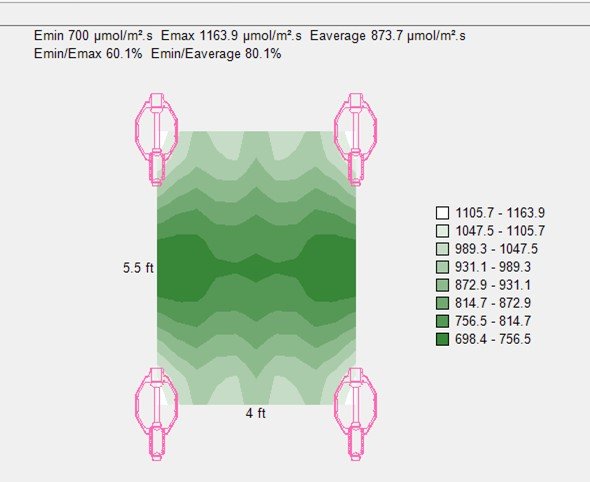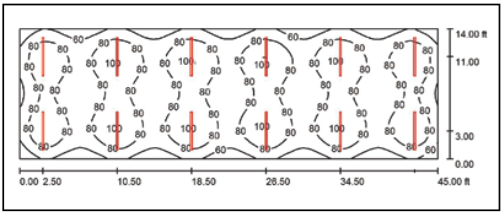Professional Explanation of Solar Street Light Uniformity
1. Definition and Importance of lighting Uniformity
- Definition: The uniformity of solar street lights refers to the evenness of light distribution on the road. It is an important indicator of lighting quality, reflecting how evenly the light source illuminates the area. Generally, uniformity is defined as the ratio of the minimum illuminance to the average illuminance or the ratio of minimum to maximum illuminance.
- Importance:
- Improving visual comfort: Uniform lighting reduces eye fatigue, making it more comfortable for pedestrians and drivers at night.
- Enhancing safety: Even illumination reduces shadows and dark areas, thus increasing road safety and reducing traffic accidents.
- Compliance with standards: Different types of roads have varying uniformity requirements according to the Urban Road Lighting Design Standards.
2. Factors Affecting lighting uniformity ratio
- Fixture Design:
- Optical Design: The design of fixtures directly affects light distribution.
- Light Distribution Technologies: Features that enhance even light output in fixtures.
- Pole Height and Fixture Arrangement:
- Pole Height: The height of the pole should be appropriate for the width of the road.
- Fixture Spacing: Proper spacing improves uniformity. A basic formula for spacing is:S = (W × √H) / (2 × √L)
Where:
- S = Spacing of fixtures
- W = Road width
- H = Pole height
- L = Fixture luminous flux
- √ = sqrt
- Type of Light Source:
- LED Lights: LED lights have high efficiency and better control, achieving uniform light distribution.
- Sodium Lights: These generally have lower efficiency and poorer uniformity.
3. Methods to Calculate Uniformity of light
- Minimum to Average Illuminance Ratio:Uniformity (U) is calculated as:U = Emin / Eavg
- Measure illuminance at several points on the road.
- Calculate minimum (Emin) and average illuminance (Eavg).
- Use the ratio to determine uniformity.
- Minimum to Maximum Illuminance Ratio:Uniformity can also be calculated as:U = Emin / Emax
- Measure illuminance at several points on the road.
- Calculate minimum (Emin) and maximum illuminance (Emax).
- Use the ratio to determine uniformity.
4. Methods to Optimize Uniformity
- Light Distribution Technologies:
- Using micro-prismatic panels to improve light uniformity.
- Installing internal reflectors to redirect more light to target areas.
- System Design Optimization:
- Implementing smart control systems to adjust fixture brightness based on environmental conditions.
- Configuring solar panels to ensure consistent power supply.
- Material Selection:
- Using materials with good light transmission for lamp covers.
- Selecting durable materials to maintain performance over time.
5. Real-World Application Cases
- Shenyang Engineering Institute New Campus:
- Utilized intelligent charging and discharging control, achieving high uniformity with an average illuminance of 30 lux and uniformity ratio no less than 0.4.
- Yangtian Avenue:
- The urban arterial road achieved an average illuminance of 20 lux with a uniformity ratio no less than 0.4.
6. Conclusion
The uniformity of solar street lights is a critical indicator of lighting quality. With effective fixture design, optimized systems, and wise material selection, uniform lighting can significantly enhance road safety. While solar street lights have limitations on expressways and major roads, their application prospects on secondary and branch roads are promising. Advancements in technology and market promotion are expected to improve the uniformity and overall performance of solar street lights, leading to wider applications across various road types.
tag:what is uniformity in lighting
Related must-read articles
Solar Street Light Height and Distance Spacing Calculation
Understanding Solar Street Light Color Temperature (CCT): Kelvin
What is Lux in Lighting? Solar Street Lighting Lux Level standard
Lumens vs watts: lumens to watts conversion chart
Understanding the Luminous efficacy of Solar Street Lights
Solar Street Light Tilt Angle Installation: A Comprehensive Guide
Color Rendering Index (CRI) in Solar Street Lights
Solar Street Lights Battery Comprehensive guide
Guide to Selecting Solar Street Light Poles
Solar Street Lights Design Guide: Key Calculations and Considerations

